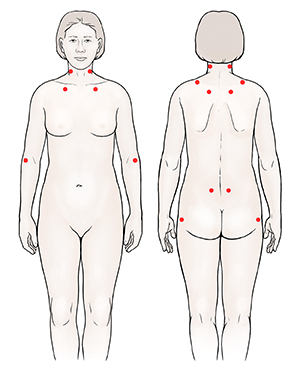Understanding Fibromyalgia
Fibromyalgia is a condition that causes chronic pain. The pain may be all over the body or at certain points on the body. You may also have soreness, stiffness, and severe tiredness (fatigue).
What are the symptoms of fibromyalgia?
Some people have pain all over their body. But in most cases, you will have tender points on your body. These points are very sore, especially when touched. Finding several of these points along with other symptoms helps your healthcare provider diagnose fibromyalgia.
 |
| People with fibromyalgia tend to have at least 11 of the 18 tender points shown above. |
Along with the tender points, you may have some or all these symptoms:
-
Constant tiredness (fatigue), even after a full night’s sleep (nonrestorative sleep)
-
Problems with memory or clear thinking, called fibro fog
-
A burning or throbbing pain in many parts of the body (this pain may vary during the day)
-
Stiffness or aching all over your body
-
Numbness or tingling in your arms and legs
-
Trouble sleeping
-
Bowel problems (bloating, diarrhea, constipation, irritable bowel syndrome)
-
Irritable or overactive bladder
-
Pelvic pain
-
Jaw pain
-
Migraine or tension headaches
-
Depression
-
Anxiety
How is fibromyalgia diagnosed?
There is no specific lab test to diagnose fibromyalgia. Instead, your healthcare provider will take your health history. They will also look at your joints and muscles. Certain criteria are used when diagnosing fibromyalgia. Symptoms need to be present for at least 3 months. Tests may be done to rule out other health problems with similar symptoms. Then you and your provider can make a plan to help you manage your symptoms.
How is fibromyalgia treated?
Your healthcare provider may advise 1 or more of these treatments:
-
Medicines. Several medicines may be used to treat fibromyalgia. Two were first made to treat depression. They are duloxetine and milnacipran. A third is pregaballin. It was made to treat nerve pain.
-
Pain relievers. Certain medicines may be used to ease pain. Your provider may tell you to take acetaminophen or a nonsteroidal anti-inflammatory drug (NSAID) like ibuprofen or naproxen. Opioid pain medicines and sleep medicines like zolpidem are not advised for treating fibromyalgia symptoms.
-
Lifestyle changes. You may feel better if you get enough sleep and exercise regularly. Yoga and tai chi are gentle, meditative exercise options. Eating healthy foods may also help with symptoms.
-
Cognitive behavioral therapy. This is a form of talk therapy that can help manage depression and anxiety
-
Alternative treatments. Some people feel better after trying massage or chiropractic treatment. Other choices are biofeedback or acupuncture.
Online Medical Reviewer:
Dan Brennan MD
Online Medical Reviewer:
Marianne Fraser MSN RN
Online Medical Reviewer:
Rita Sather RN
Date Last Reviewed:
3/1/2024
© 2000-2024 The StayWell Company, LLC. All rights reserved. This information is not intended as a substitute for professional medical care. Always follow your healthcare professional's instructions.